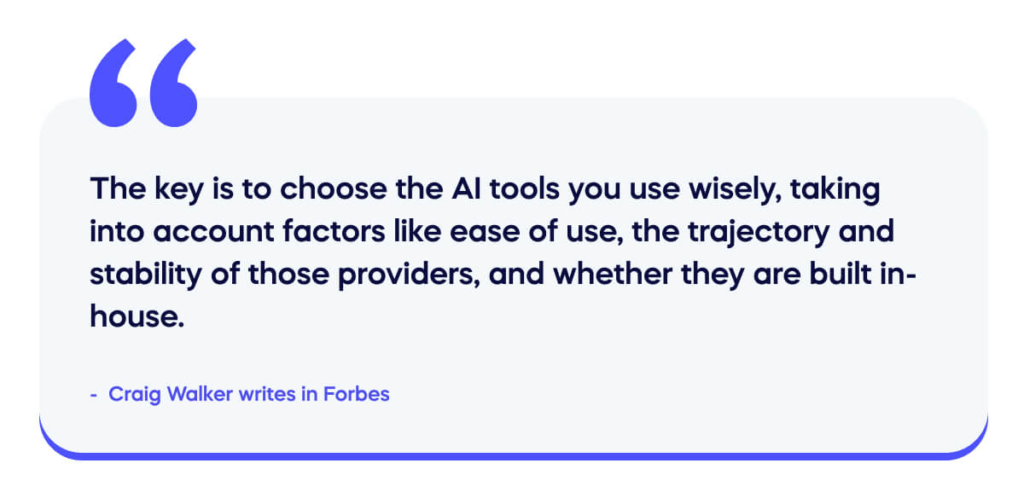Some of the top research shows that the key AI adoption challenges today are skills, costs, tools, data complexity, and project complexity.
Generative AI is getting settled. Month by month, more third-party applications are launched, businesses are achieving an ROI on their investments, and workers are getting used to the idea that they must understand how to utilize these tools.
This article will help you understand the barriers that stop many firms from discovering AI’s advantages.
Inspired by key 2023 research from Statista, we will discuss the following adoption challenges:
- Skills
- Cost
- Lack of tools or platforms to develop models
- Data complexity
- Project complexity
Without a doubt, AI has an important role in the workplace.
For almost all businesses, adopting AI solutions is a question of “when,” not “if.” If you can better understand the challenges now, you’ll have a better chance of staying ahead of the game.
The AI adoption challenges are worth it!
We’ve got to admit it – this article has been slightly sour-faced. We’ve been obsessed with the challenges, but we haven’t taken the time to think about the enormous benefits of AI.

Here are some reasons to be cheerful:
- You can use efficient and low-stakes AI initiatives that will quickly prove their worth. As Craig Walker writes in Forbes – “The key is to choose the AI tools you use wisely, taking into account factors like ease of use, the trajectory and stability of those providers, and whether they are built in-house.” If you start cautiously, you’ll find ways to appreciate the value of AI technologies.
- The costs of AI systems are continuing to go down. 2023 research from ARK shows clearly that hardware, software, and model costs are decreasing very quickly. So, although you shouldn’t delay your plans too much, waiting a few months might help to get your projects started more quickly and effectively.
- Fortunately, more and more companies are now offering excellent AI capabilities within their regular offering. So, if you are afraid of implementing AI solutions, Digital Adoption Platforms can now support AI deployment and optimization. Walkme, for example, offers “unprecedented visibility into the applications running in your organization, who is using them, and whether they are being used as intended.”
As we’ll see, adopting artificial intelligence for your niche business processes will be difficult. But year after year, the challenges of today will be solved – more comprehensively, efficiently, and quickly.
So, let’s look at the major challenges you’ll have to deal with when you implement AI projects in 2023.
Undeveloped AI Skillset
There is a major staff shortage with a deep AI specialism, as KPMG reported in 2023.
However, the skillset for AI remains underdeveloped. There is a scarcity of experts in this field. Moreover, individuals with substantial experience in generative AI on their CV are few and far between.
That skillset includes ethical awareness, data processing, and a deep understanding of natural language processing. And week by week, the challenges of prompt engineering are becoming clearer.
Until recently, relevant employee training simply didn’t exist for AI. Now, more programs, courses, and workshops are emerging. Before long, this shouldn’t be a problem anymore.
The cost of implementation
Everyone desires to save money. However, the initial implementation of such measures can be costly. There is a significant disparity between casually experimenting with ChatGPT on your phone and fully integrating robust systems throughout your entire organization.
Implementation costs encompass a range of expenditures, including data acquisition and preprocessing, infrastructure and hardware investments, software development, talent acquisition and training, and ongoing maintenance and upgrades. These multifaceted costs can strain budgets.
You need to plan carefully to ensure that the benefits of AI adoption, such as increased efficiency and competitiveness, ultimately outweigh the financial commitments. Moreover, the dynamic nature of AI technology means that staying up-to-date and adapting to evolving requirements adds complexity to cost estimation and management.
But even if you have the money, this isn’t the only barrier you’ll face.
Lack of tools or platforms to develop models
We know how effective AI can be – but making it accessible and usable is still a big challenge.
Developing business-specific AI models requires specialized software, infrastructure, and technical expertise. When businesses lack user-friendly tools and platforms that simplify the model development process, it becomes a significant barrier for non-technical stakeholders.
Streamlined and accessible tools are essential to democratize AI and enable a broader range of professionals to harness its capabilities, fostering wider adoption and innovation within organizations.
Data Complexity
For years, digital-first businesses have required an effective data strategy to do their work effectively. Applying AI to business requires a whole new data infrastructure.
The intricacies of data privacy and data security require stringent measures to protect sensitive information, adding complexity to data handling.
Meanwhile, effective data management and governance become essential as businesses grapple with vast volumes of historical data that need to be cleaned, structured, and maintained for AI applications.
Navigating this complexity demands significant resources and expertise, often acting as a bottleneck in AI adoption as organizations strive to ensure compliance, safeguard data, and extract meaningful insights from their data assets.
Project complexity
We all know how to handle a bit of AI on our desktop – but what about when we want to integrate it at a greater scale? That’s when it becomes an adoption challenge!
Implementing AI involves a spectrum of tasks, including data collection, preprocessing, model development, integration, ongoing maintenance, and ensuring ethical and legal compliance.
The complexity arises from aligning these diverse components cohesively, often requiring cross-functional collaboration, specialized talent, and substantial resources. This intricacy can lead to project delays, cost overruns, and increased risks, making effective project management and strategy vital for successful AI adoption.
Don’t fear the AI adoption challenges
Every new technology poses risks to its users. These five major challenges are only a small part of the wider AI risks that companies face.
Is this bad news? Funnily enough, the answer is “no.” The long history of IT means that many companies and services have diverse skill sets for AI adoption, thanks to their background working with other technologies.
As we mentioned above, Digital Adoption Platforms are one of the key tools that help with the transition to an AI-mature company.
‘DAPs like WalkMe have been tried and tested through countless applications. So you can count on them when integrating AI into your company’s business processes.
Now that you know the main challenges, you’re ready for your AI digital adoption.


